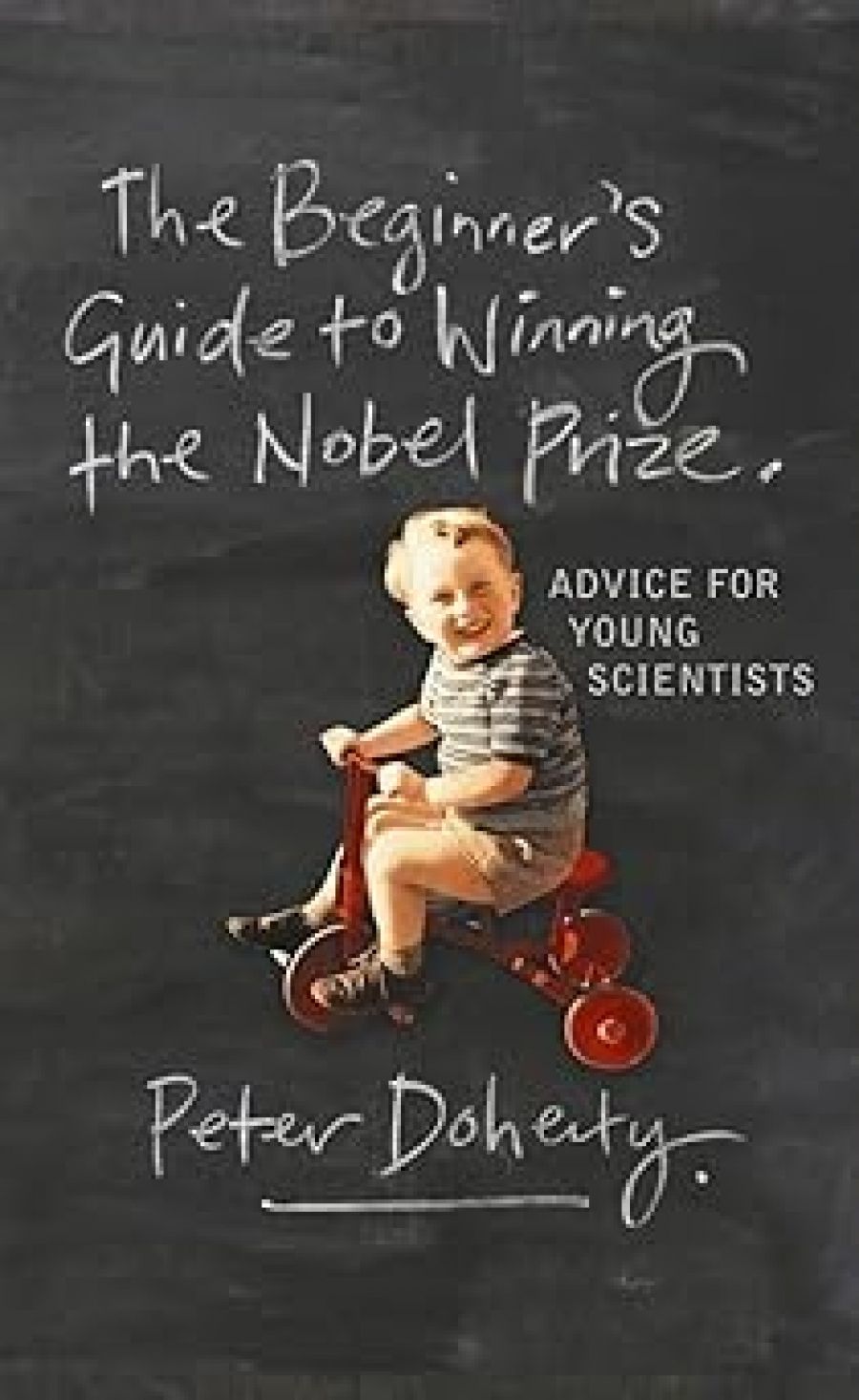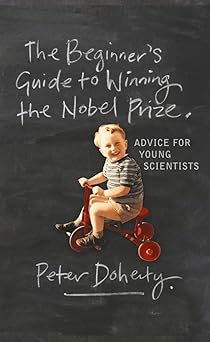
- Free Article: No
- Contents Category: Memoir
- Review Article: Yes
- Article Title: The Nobel for vainglory?
- Online Only: No
- Custom Highlight Text:
We revere Nobel laureates – and rightly. Sometimes that admiration is not repaid well, and those eminences become prey to a variant of Lord Acton’s wisdom – ‘All fame tends to corrupt’ – and consider themselves intellectual Pooh-Bahs: ‘Lord High Everything Else.’ A consequential risk of such renown is that bystanders who can see and vouch for reality are commonly unable to tell the truth to the famous.
- Book 1 Title: The Beginner Guide to Winning the Nobel Prize
- Book 1 Subtitle: A life in science
- Book 1 Biblio: Miegunyah Press, $34.95 hb, 299 pp, 0522851207
- Book 1 Cover Small (400 x 600):

- Book 1 Cover (800 x 1200):

Yet Professor Doherty does have an ironic sense, and the laconic Queenslander has not been entirely smothered by fame and his many years in the US. Furthermore, his book is a refutation – granted not the most eloquent or elegant rebuttal, yet an effective one, nevertheless – of C.P. Snow’s deadening doctrine of the ‘Two Cultures’. Most scientists have more than a trivial acquaintance with the arts; for many it is an informed passion. Doherty clearly loves literature, and his references to it are not at all contrived. After reading this book, any young person could confidently draw the lesson that abandonment of the arts is not a precondition for scientific success. Even so, I regret that, while Doherty includes learning to write clearly and concisely in his list of desiderata for scientific, let alone Nobel, success, this is in a trivial paragraph of a mere nine lines. His own plain style is hardly a gleaming endorsement of his advice.
To be frank, he seems to have been only skimpily served by his editors. Time and again I wished that he were less cryptic: he often breaks off an idea or an explanation too soon, and if I feel the need for additional detail, then what of the non-scientific but engaged reader? Perhaps this is a sign of rush – either of writing or production – like the curious (and unmotivated) changes in typeface at a few locations. I must also admit to irritation by his repeated mention of innumerable other prize winners (curiously, with little or no mention of what they did or why it was so important), as if they are all members of some exclusive club (perhaps that is how those great men and few women really see themselves?), with the implication that we outsiders should be grateful for the occasional crust that falls from the rich feasting table of the elect.
But at its best, this book is both engrossing and, as one would expect, wise about the philosophy and praxis of science. If only our politicians and bureaucrats would learn from it! Doherty’s discussion of his own field of immunology (‘Immunity: A Science Story’) is lucid and fascinating: his extended image of the CD8+ class of T lymphocytes (cells which originated from the thymus gland) as ‘smart sea-mines’ which, in the process of immune surveillance, ‘assassinate virus-infected cells’ is immensely illuminating. Because of the number of diseases that are consequences of disturbed immune function, this is important reading. Whether our concern is HIV/AIDS, malignant tumours, asthma, multiple sclerosis, organ transplantation, our responses to diverse infections – all of them have important immunological dimensions, as well as being ubiquitous and perennial threats to our welfare. Doherty is passionate about such questions.
Elsewhere, I felt that he might have been more outspoken, especially about the politics of science, even at the risk of seeming arrogant or omniscient. The problem is the almost universal public caution and self-effacement of scientists: who could name a single president of the Australian Academy of Science of the past decade? Yet those people should always be arguing overtly for science and its importance – pragmatic and cultural – for our society. I am not asking Professor Doherty and his eminent colleagues to be strident, but I certainly want them to be more courageous, more colourful, more pertinacious. They cannot simply leave it to our few scientific journalists, excellent though the likes of Peter Pockley, Norman Swan and Robyn Williams are.
Doherty has written a chapter on religion and its tensions with science, but, as I found with a number of the others, its thought is a bit rudderless. Like art, religion seeks to understand our essential selves and our place in the world in quite a different way from science, which must employ careful observation and measurement in combination with the most rigorous analysis. To that extent, I suppose, there are several cultures. When he considers America and its science – both now and in the future – Doherty seems to ignore the extent to which (as a by-product of their national history, perhaps) even American scientists want to believe. Scepticism is the bedrock of the best science, but Americans can appear dangerously disposed to jettison it.
Doherty has a very clear sense of the fact that science is a great co-operative venture and that even the humblest researcher, if she or he is critical and honest, contributes to it nobly. When I was reading the book, the thrilling announcement was made of the award of the 2005 Nobel Prize to Drs Robin Warren and Barry Marshall: theirs is an extraordinary story which wonderfully illustrates Doherty’s precept, ‘Value evidence and learn to see what’s in front of your nose’. He writes: ‘There can be a worm in the shiniest apple and sometimes, of course, the worm is more interesting than the apple.’ Just so, but as that Helicobacter odyssey shows, it is often difficult to persuade one’s colleagues. If they can be dogmatic and intransigent, who can blame the public for fearing what they do not understand? Love of certainty can be as fatal to science as to art and good government. ‘Perhaps,’ Doherty writes, ‘it would be useful to develop ways to convey the sense that a measure of frustration and uncertainty is also a normal part of the reality with innovative science.’
Politicians want ‘pay-offs’ and guaranteed ‘outcomes’ for their expenditure of taxpayers’ money. They need to remember Karl Popper’s view that science can progress only as we kill off our favourite theories and replace them with more plausible ones that accord with better evidence. If this new book helps the nation to understand – and to welcome – that uncertainty and its influence, it will have been worthwhile (though it might have been better called, ‘The beginner’s guide to understanding science’) because science is, perhaps, mankind’s most gloriously successful venture – and adventure.


Comments powered by CComment